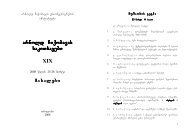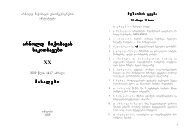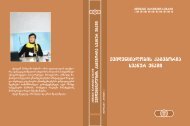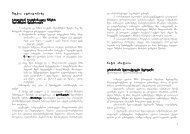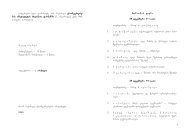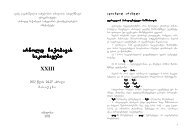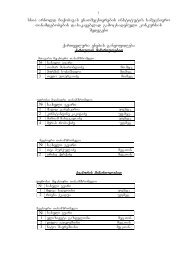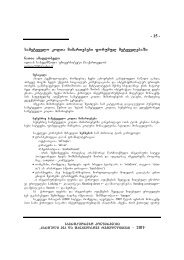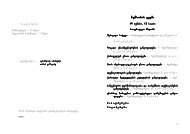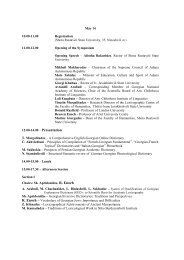5 r. a b a S i a (Tbilisi) bgeraTSesatyvisobis erTi rigisaTvis qarTvelur ...
5 r. a b a S i a (Tbilisi) bgeraTSesatyvisobis erTi rigisaTvis qarTvelur ...
5 r. a b a S i a (Tbilisi) bgeraTSesatyvisobis erTi rigisaTvis qarTvelur ...
Create successful ePaper yourself
Turn your PDF publications into a flip-book with our unique Google optimized e-Paper software.
adhering to strict standard requirements. These are native speakers of middleliterary<br />
type of literary norms.<br />
Linguists have different opinions on the existence of ethnolocal variants<br />
of the Russian literary language. We consider, that the norms of the Russian<br />
literary language are uniform and there can not be their variants. “If language in<br />
general is necessary for communication“– wrote A.M. Peshkovsky, “then for<br />
cultural dialogue it is necessary to have the language as if squared, the language<br />
cultivated as special art, the language normalized“.<br />
There will hardly be found at least one linguist, the philosopher or the<br />
teacher among scientists, who would not be concerned about the decrease of the<br />
general speech culture level. As N.G.Komlev mentioned that “the culture of<br />
speech influence has fallen to the lowest point. Russian speech catastrophically<br />
lags behind high canons of the Russian literature. It becomes more and more<br />
primitive, stylisticly helpless and frequently vulgar”.<br />
If such situation is in Russia as a whole, it is easy to imagine the state of<br />
Russian speech in regions where in the conditions of national – Russian<br />
bilingualism different sorts of factors have an adverse effect on culture of<br />
communication: socialinguistic, demographic, confessional.<br />
The general level of speech culture in the Caucasus is low, this results<br />
from the fact that negative influence on it is formidable. The external factors<br />
reducing level of culture of Russian speech the influence of mass-media<br />
language, lack of speech culture of telecasts, low level of language culture in<br />
the country.<br />
The negative factor decreasing quality of a standard of speech of<br />
Daghestanian-bilingual is a nearly absolute absence of the social control of a<br />
correctness of communication. It is caused by considerable reduction of the<br />
number of Russian population, by whose speech bilinguals are guided. Besides,<br />
Daghestanian-bilinguals have a low threshold of bilingual sensitivity to speech<br />
error.<br />
From the point of view of socialinguistic a major factor causing a<br />
phonetico-phonologic interference, is insufficient development of phonologic<br />
consciousness and the phonetic hearing based on it. The characteristic<br />
phenomenon of bilingualism is rigidness. That is the difficulty of switching of<br />
mechanisms of speech-apprehensional process and an organs of articulation.<br />
122



